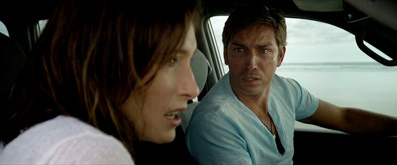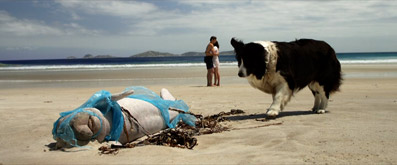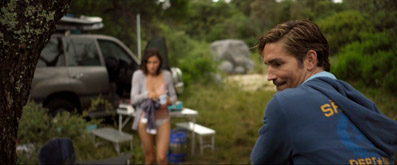|
Not so long ago it seemed that the recent spate of horror remakes was confined to Hollywood, but if Jamie Blanks' Long Weekend (aka Nature's Grave) is anything to go by then the practice is spreading beyond American shores. The original film, directed in 1978 by Colin Eggleston (referenced here by a pub named The Eggleston Hotel), has over the years made its way up to cult status, which despite being Australian in origin makes it sure-fire food for the remake machine. The only surprise is that this new version was made not in Hollywood but in the very same country that gave birth to the original.
If by chance you do know the first film, see if anything here rings a bell. Argumentative middle-class couple Peter and Carla head off for the holiday weekend in an attempt to patch up their failing marriage. Their destination is a beach whose location is largely unknown to the general public or, it would seem, to the occupants of a bar situated not far from the turnoff that is reputed to lead to it. Peter takes what he believes to be the correct path, but the couple soon become lost in dense woodland and elect to spend the night in their vehicle. The following morning they discover that they are just a short walk from their intended destination, but a series of thoughtless transgressions against the animals and landscape prompts nature to begin responding in kind.

Sound familiar? Yep, the new version of Long Weekend is essentially the old version of Long Weekend with different actors, and the similarities extend way beyond the basic plot outline. With a few minor variations here and there, this is scene-for-scene the same movie, right down to the small detail of how sequences play out: the second car hit on the kangaroo Peter accidentally runs over; his 'surprise' discovery that their dog Cricket has stowed away in the car; the jerry-can that reveals he has driven round in a circle; the argument that takes place in the couple drive along the beach; the snake that causes Peter to pause in his climactic run through the trees; the eagle attack and the smashing of its egg on a tree; the cross-cutting between Carla's in-tent masturbation and Peter's fall from a surf board; and the almost moment-for-moment recreation of the couple's first morning in the woods. And these are just a few examples from a film that really is brimming with carbon-copy components. The central themes remain unaltered and the same offenses as before trigger exactly the same responses, with only minor variations in timing and location separating how the two stories play out. The new film has even been shot in the same aspect ratio, though it's probably best not to read too much into that.
There's no question that a strong original is a handicap for any potential remake, but in the right hands it can prove a springboard for a new take on the story – John Carpenter's The Thing, David Cronenberg's The Fly and Phil Kaufman's Invasion of the Body Snatchers come readily to mind, all three of which brought something new to the original concept that enabled them to comfortably stand on their own merits. But the only new element here is Peter's nationality switch from Australian to American, a decision that we can presume was taken with the international market in mind and which had already been road tested in Greg Mclean's Rogue. This does tend to highlight Peter's outsider status in a story in which he and Carla are supposed to be on equal footing, something emphasised by James Caviezel's performance – there's nothing technically wrong with it, it's just that his version of the irritable American male is one we are regularly exposed to through movies and TV. It thus can't help but feel generic in a way that John Hargreaves' performance in the original never did, at least to an international audience (Australian viewers can feel free to disagree on this one). There's also something of a spoilt brat element to the new Peter that makes him damned near impossible to connect with or care for when things turn bad, something the original film achieved in spite of the character's self-centred arrogance.

Though not a shot-for-shot remake in the manner of Gus Van Sant's Psycho, this new version of Long Weekend feels every bit as redundant, a near clone of the first film that somehow loses the essence of what made its predecessor so creepily effective. If you've not seen Eggleston's low budget original then you'll probably have less to gripe about, but I'd seriously suggest you hunt it out anyway, as save for the cut of the clothes and the the use of maps instead of a faulty sat-nav (and a mobile phone with no signal, of course), it hasn't dated a jot.
In common with a good many modern medium budget features, Long Weekend was shot on digital rather than film, in this case using the Arriflex D20, a camera that produces film-like results, though in common with many digital systems it can't quite match the richness and contrast range of 35mm, resulting in a few burned out whites and some loss of detail in darker areas. Otherwise the contrast is very good and the detail crisp, and it's nice to see a colour palette that hasn't been dragged through the tinting machine and that for much of the film feels close to natural.
You can chose between Dolby 2.0 stereo and 5.1 surround tracks, and fine though the stereo track is, it's the surround that serves the film best. Both are clear, but there's an extra notch of finesse and punch on the 5.1, particularly in the deep bass of the sinister chords and sudden jolts. It also uses the full sound stage for music and effects – gunshots fired from the front will impact behind you, the sound of surf is all around when Peter is in the water, and his night-time isolation has him assaulted by noises from all sides.
This is a 2-disc release with a decent collection of extras, most of which are on disc 2. On disc 1 there is only the Trailer (2:28) and includes at least one major spoiler, so leave it alone until after the film.
Disc 2
Director's Production Diary (40:16)
A collection of behind-the-scenes footage with a voice-over from director Jamie Blanks, which alternates between waterfalls of words and silence, depending on what we're looking at. There's some brief background on some of the personnel, and plenty of interesting stuff for us techie types on the equipment used and the filming of specific scenes, including the finale, which is covered in more detail below. With an astonishing lack of irony given the film's story and theme, Blanks describes the process of spray-killing hundreds of flies that were interfering with the shoot and that it was "nice to take a little bit of revenge against those fuckers." Nature, I would hope, has taken note and will react accordingly.

The Interview Gallery has three short interviews, two of which could also function as supplements for Optimum's extras-free release of the original film.
Lead actress Claudia Karvan (7:20) discusses playing Carla, working with lead actor Caviezel and director Blanks, shooting on location (loves it), dealing with the flies, and Eggleston's original (loves that too).
Screenwriter on both versions Everett De Roche (7:39) outlines the story and talks about his inspiration to write the first version, working with directors Eggleston and Blanks, writing in this genre, and his reaction to the actors' interpretation of his words. He also discusses the differences between the original and the remake and reveals that he was pushing to update the story but that Blanks was determined to 'stay true' to the first film.
Best of all, Toby Eggleston (5:46), son of the original film's director Colin Eggleston, talks about how that film was received (it did well overseas but badly at home), its present cult status, his father's influences (there's a real surprise here) and his vision for the film.
Deleted Scene – Jim and Ducks (1:59)
Referred to in the production diary, this is a scene that I can't imagine ever fitting into the flow of the movie in which Caviezel spends two minutes threatening ducks with an impersonation of Christopher Walken. Technically the impression is rather good, but just ten seconds in I was willing for it to end.
Making Of (31:00)
An enjoyable and revealing commentary-free collection of behind-the-scenes footage that follows the shooting of some of the key scenes, the use of fake and real eagles for the bird attack, the camera rigs (I always like this stuff), casting Karvan's head for an effects shot, and the fibreglass dugong.
Taming the Wild (10:16)
A look at the work of the animal trainers and wranglers on the film, including Darren Tilley (snakes and other bush animals), Andrew Payne (eagle), and Luke Hura, who gives an interview about working with Star, the dog who plays Cricket.
Behind the Scenes with Grant Page & Roger Ward (22:24)
OK, this is not the full title of this extra and if you've not seen either version of the film then do yourself a big favour and do NOT select the extras section until after you've done so, as the missing words here act as a spectacular plot spoiler and are printed on the extras menu. Full marks to Showbox for not putting them on the DVD package. All I'm prepared to tell you about this one is that it's a detailed behind-the-scenes look at the filming of a key scene and is well worth watching, but only after you've seen the main feature.
If you've not seen Colin Eggleston's forward-looking and unsettling original, then Jamie Blanks' retake may just work for you, but since the first film is still freely available on DVD why not go with that? The transfer on Optimum's UK release isn't that great, but it can be picked up for a song at the moment and owners of multi-region players (that's all of you, right?) will also have access to the Australian region 4 Collector's edition, which apparently has a rather good transfer (I'm working on second-hand information here so can't confirm this) and an audio commentary with executive producer Richard Brennan and cinematographer Vincent Monton. If you do go for the new version then the Showbox's 2-disc release certainly delivers, with a solid transfer and a decent collection of extras.
|